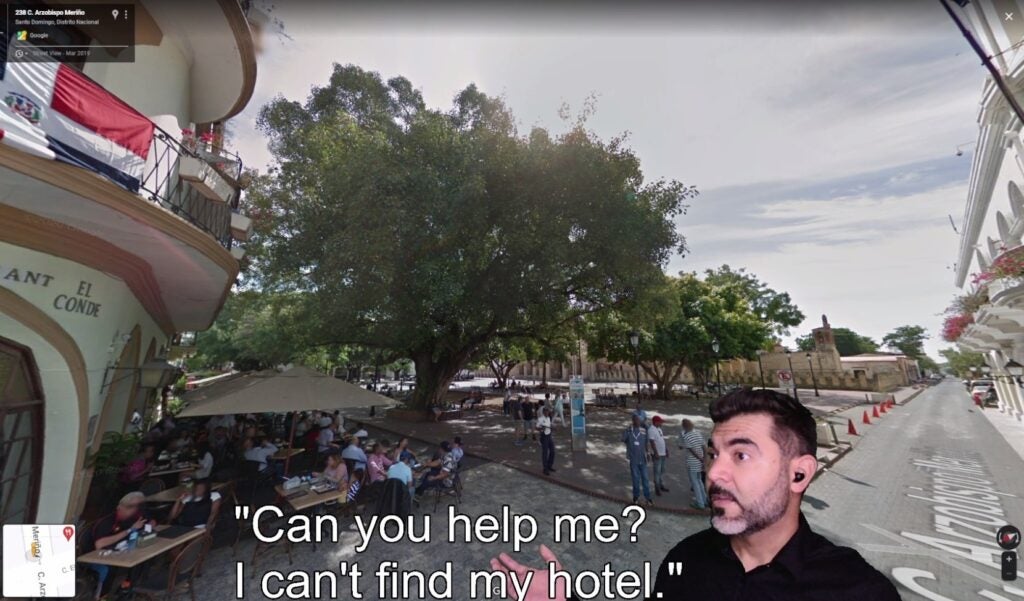Understanding and appreciating new cultures has really helped me understand and appreciate my own. This awareness helps me represent my American culture in an authentic, honest, open-minded manner.
Gorge Miramontes recently concluded his second online ESP (English for Specific Purposes) project with the Tourist Police of the Dominican Republic through English Language Programs. The learners varied in age, gender, professional rank, and English proficiency – from true beginners to lower intermediate. Since these officers are regular intermediaries between English-speaking tourists and local citizens, businesses, and institutions, they need to be able to communicate effectively in situations which are often tense. In addition to developing basic English skills, the classes focused on interactions related to tourism, law enforcement, and emergency assistance. Miramontes relied on role-play scenarios, communication improvisation, and problem-solving through task-based activities. The course included eight class hours per week and two hours of virtual office hours, where learners were able to drop in to ask questions, practice material from class, or simply have informal conversations.

Building Background Schema
It’s no surprise that Miramontes was selected by the U.S. Embassy in the Dominican Republic for this project; he had previous experience teaching English to the Colombian National Police. Although both police forces share Spanish as their working language, it wasn’t an apple-to-apples assignment. “I knew that the needs for these learners [in the Dominican Republic] would be quite different, as their work environment as tourist police created different expectations,” Miramontes explains. Although this was his first experience teaching students from the Dominican Republic, he recalls previously meeting many Dominicans while working in Wisconsin, and he built on these memories during the pre-project planning process, learning more about Dominican culture, history, and tourist destinations.

Optimizing Technology for the Virtual Classroom
For most of the learners, it was their first experience not only with virtual learning, but also with virtual meetings. Miramontes decided to simplify the use of video conferencing tools at the beginning of the course and integrate additional tools into the lessons as the students became more comfortable with the platform and virtual learning environment. One app that he was able to successfully retool for edtech purposes was OBS (Open Broadcasting Software) streamcasting and recording software. Miramontes explains that for him it functioned as a virtual whiteboard, evoking a sense of familiarity by mirroring the traditional classroom. “The software allowed me to appear or disappear from the screen as needed, avoiding a teacher-centric learning environment,” he says, adding that the app was respectful of students’ limited bandwidth.
For Miramontes, the course expanded his own online skills. For example, he learned how to do familiar tasks differently in an online environment, in particular “grading language and adapting material in order to keep the course challenging and interesting for all the learners.”
Leaning and Listening In
Miramontes recalls a particularly rewarding moment when an officer, who had started the course as a true beginner, was attending the online class while also working at his police station. In the middle of an activity, a tourist came into the station seeking assistance. When the officer left his computer to speak with the tourist, he forgot to turn off his microphone, and the whole class was able to listen to the interaction. “The student was able to communicate smoothly and effectively with the tourist using many of the things we had practiced in class recently. The experience was motivating for him and for the whole class,” Miramontes says.
Virtual office hours allowed the police officers and their teacher to build rapport and learn from each other in a less structured environment. Miramontes notes that although the course participants were open, friendly, and welcoming, their professional work often put them in stressful situations, such as monitoring the safety and behavior of tourists during tropical storms. “The experiences that they shared with me really gave me a renewed appreciation for the work of law enforcement, and particularly those tasked with helping tourists,” he adds.

Gorge Miramontes was born in Chicago, Illinois, and grew up in the United States and Mexico. He completed his undergraduate studies at the University of Wisconsin-Parkside in Kenosha, Wisconsin. While completing his major in English Creative Writing, he started his ELT career by tutoring international students at the university and volunteering at a local high school’s ESL program. After graduating, he taught children and teenagers in South Korea, university students and police officers in Colombia, and adults in Saudi Arabia. During the six years he lived in Colombia, he also completed an M.A. in Applied Linguistics and TESOL from the University of Leicester. He is currently living in Guanajuato, Mexico, and recently completed a virtual project with the Ministry of Foreign Affairs of Panama.
